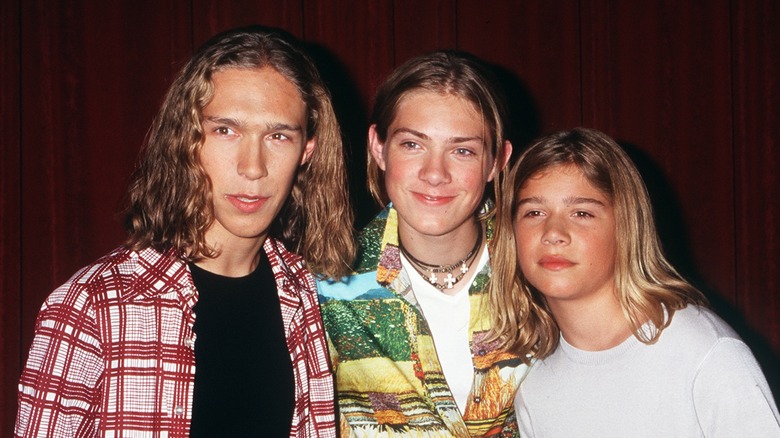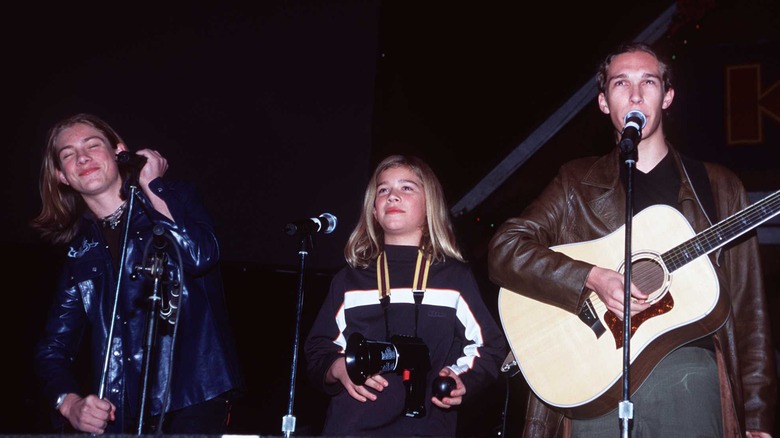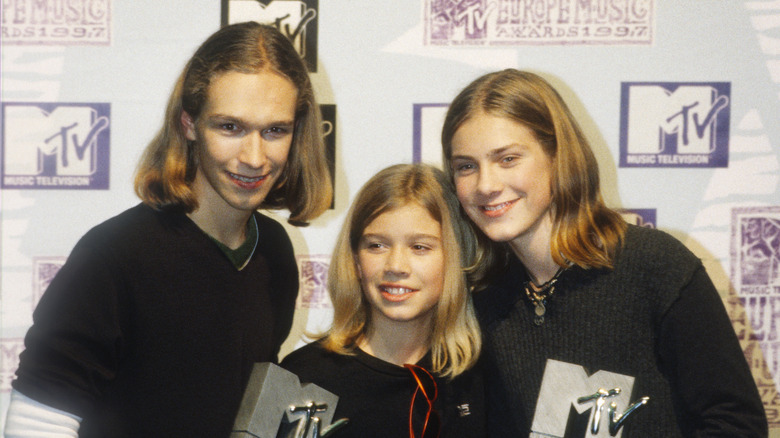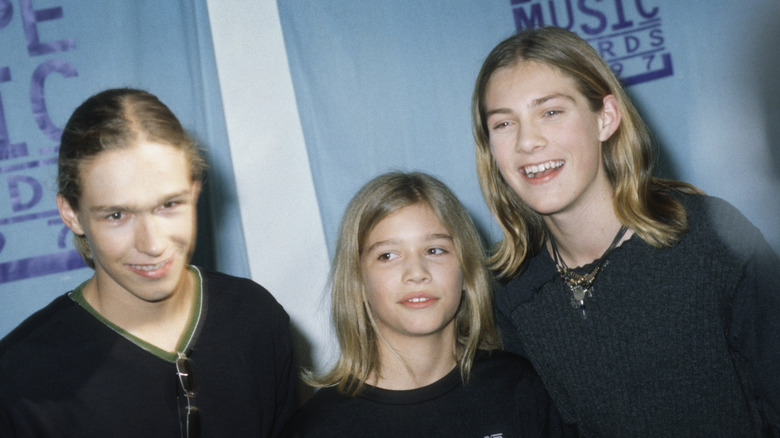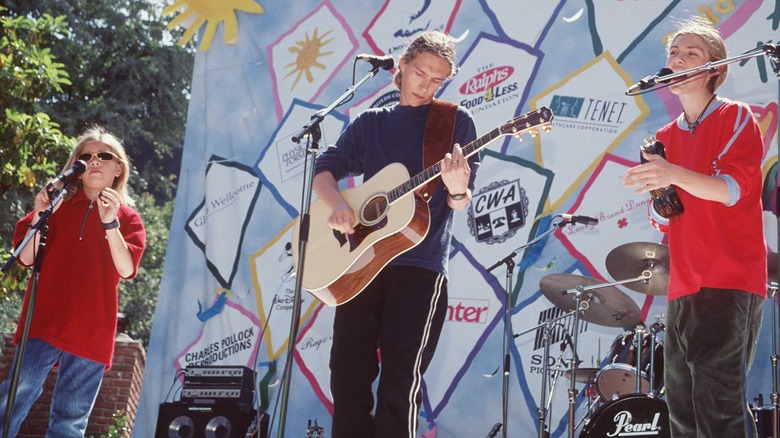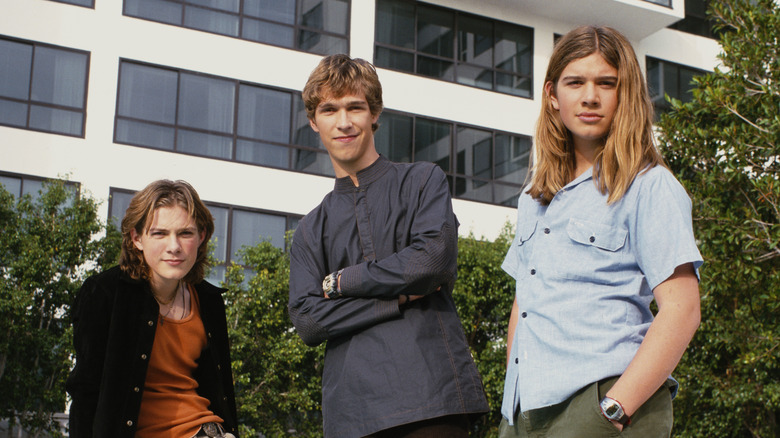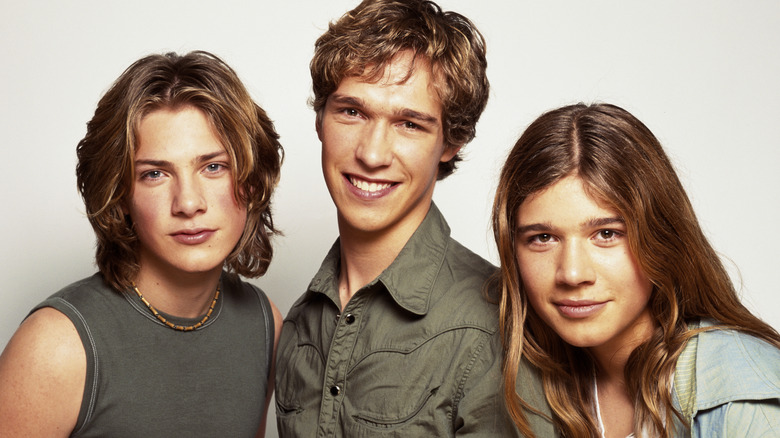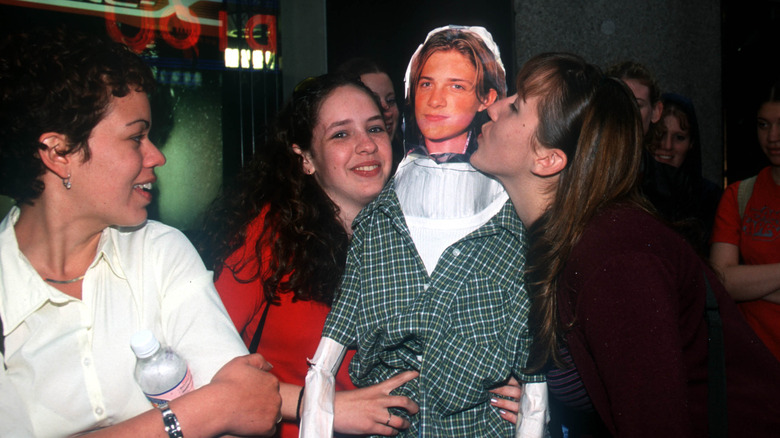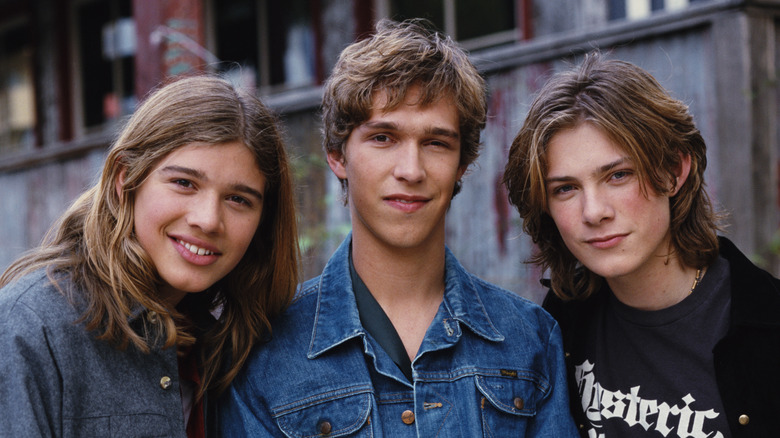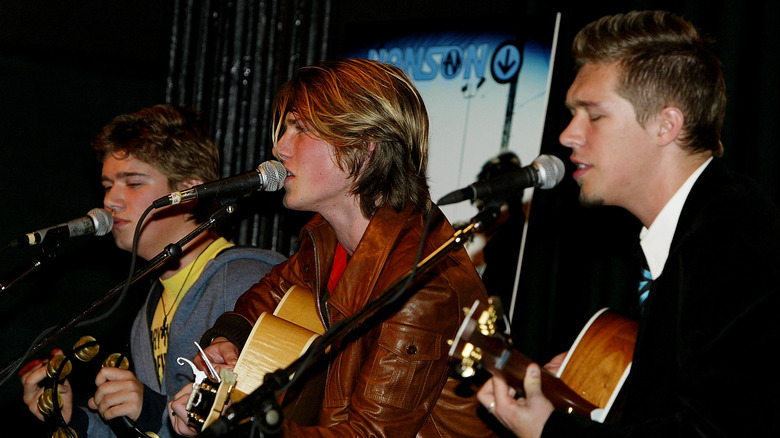Things Only Adults Notice About Hanson
If you were anywhere near planet Earth in 1997, then you're probably familiar with "MMMBop," the infectious pop anthem that had us all singing their refrains at the tops of our lungs. "MMMBop" was the debut single from three brothers: Isaac, Taylor, and Zac Hanson, known professionally as Hanson. The blonde-headed trio were 16, 14, and 11 years old when "MMMBop" took the world by storm, garnering three Grammy nominations and turning the brothers into pop icons.
Some critics (and annoyed adults) may have been praying for a quick plummet into obscurity, but Hanson proved to have enormous staying power. Today, their pop-cultural relevance remains. "MMMBop" is still the star track of every 90s pop nostalgia playlist, and most of us can still recite the chorus of "MMMBop" flawlessly. Since their heyday, the brothers started a brewing company and an annual music festival in their hometown of Tulsa, Oklahoma. Despite a rash of controversies over head-turning comments online and purported political views, the band has held onto a sizable fanbase, better known as "Fansons."
When "MMMBop" came out, the song blew our adolescent minds. Many of us wouldn't mind revisiting those simpler times when we plastered our bedroom walls with Hanson posters and toted their CDs around like an extra limb. But, of course, those days are long gone — and the proof is in how we see the "MMMBop" crooners through our adult eyes.
Hanson probably made a fortune off of MMM-Bop
On May 24, 1997, "MMMBop" soared to the top of the Billboard pop charts and held on to the No. 1 spot for three weeks. Before long, Hanson's debut album, "Middle of Nowhere," was flying off store shelves. The record sold 10 million copies worldwide and reached quadruple platinum status in the United States. According to Details Magazine, "Middle of Nowhere" amassed $12 million in sales (via hanson.net). While we don't know the exact amount of Hanson's "Middle of Nowhere" payout, it's likely that they took home a fortune after various costs and expenses. For example, say that the trio only received 10% of their purported record sales: that still works out to $1.2 million, or about $2.3 million in today's money. The pop icons also cashed in during their 1998 tour, which garnered $9 million in gross profits.
In a 2004 interview, the band opened up about how they spent the loot from their single and album. "We didn't suddenly become jackasses and buy really stupid stuff," Isaac Hanson told Details Magazine. He added, "We invested in ourselves and built a studio." Today, "MMMBop" arguably remains Hanson's greatest claim to fame. Throughout the years, the band has continued to expand their profile — and their wealth — off the success of "MMMBop." Isaac, Taylor, and Zac each have a reported net worth of around $20 million, for a combined $60 million fortune.
Hanson were serious musicians
Thanks to their boyish looks and predominantly young fanbase, Hanson quickly earned the designation of teenybopper band. To our adolescent eyes, they were a heavenly fusion of blonde hair and cutesy pop lyrics — but in reality, Hanson saw themselves as serious musicians. The brothers composed their own music, wrote songs, and played numerous instruments. Their style set them apart from other '90s boybands, who veered towards fancy choreography and copious auto-tune. "I think they opened a lot of doors for bands like N*SYNC who were completely manufactured, whereas Hanson weren't," music producer Stephen Lironi told The Independent, "They manufactured themselves."
Young audiences probably never realized that the brothers were influenced not by pop but by genres like classic rock, Motown, and soul. "I mean, the '60s and '70s and sort of classic rock and soul music, that's sort of the thing that has always been a thread in our songs," Taylor Hanson told NPR in 2007. "And I think also, for that matter, the way we perceive the idea of hooks in pop music."
Despite breaking into the music business as children, Hanson always had a clear vision for their musical career. "You know, I really don't think we're more serious [now]," Zac shared with NPR. "It's kind of a weird thing to look back at the music. And I think often, because we were so young, the nature is to, in some way, discredit it because of the age."
Adults really, really disliked MMMBop
For many adolescents in the late '90s, "MMMBop" was like a blissful jolt to our eardrums. While kids couldn't get enough of the song, most grown-ups weren't so enthused. In fact, adults detested "MMMBop" so much that "Saturday Night Live" created a skit about it. The gag aired on December 13, 1997, and featured Hanson, Will Ferrell, and Helen Hunt. In the segment, Ferrell and Hunt play a couple of disgruntled adults who are sick of listening to "MMMBop." The characters kidnap Hanson at gunpoint and force them to listen to "MMMBop" on repeat for several hours. In the end, Isaac and Zac go catatonic, but Taylor remains unbothered. Ferrell's character realizes that he actually likes the song, which prompts Hunt's character to execute him.
The skit went over well with audiences — Pop Crush even proclaimed it one of the best "SNL" sketches ever. As adults, this vintage skit has us reflecting on how well and truly most adults hated "MMMBop." But we also can't help feeling like this sketch is a little too sadistic. Sure, it's satire — but hear us out — it also glorifies violence against the Hanson brothers, who were literal children at the time.
Adults may have found "MMMBop" unbearably simplistic, but according to record executive Steve Greenberg, that's part of the appeal. In 1997, Greenberg told People that the "MMMBop" chorus is iconic because it "means the same thing in every language" (via Salon).
MMMBop is more depressing than we realized
Before "MMMBop" became a pop-cultural phenomenon, it was a little ditty that the brothers invented one morning at their home in Tulsa, Oklahoma. Eventually, it morphed into a full-blown song, but the demo version was slow and melancholy with a darker feel. In 1997, the band linked up with producers the Dust Brothers, who reworked "MMMBop" into a faster and more upbeat tune.
The resulting version of "MMMBop" was a runaway success. But when you listen closely to the words, you'll notice it's a pretty depressing song. For one thing, the brothers lament that "only one or two" relationships will last throughout a person's life. As for the other ones? Hanson regrets to inform: "You turn your back, and they're gone so fast." And let's not forget this little nugget of existential dread: "When you get old and start losing your hair, can you tell me who will still care?"
Thanks to the catchy pop riffs and turntable scratches, young listeners paid no mind to the bleak lyrics — but as adults, we just want to know: Who hurt you, Hanson? "I'm surprised more people weren't worried about us when you look at the things we were writing at that age," Zac Hanson confessed to the Independent in 2022. "Obviously, it was packaged in a very upbeat way with harmonies and catchy guitar lines, but "MMMBop" is really about getting old, losing friends, and the fact that most things won't last."
Fame took a toll on Hanson
They may have been the cherub-faced poster boys for '90s bubblegum pop, but fame wasn't always easy for Hanson. For one thing, their schedules overflowed with interviews, live shows, and public appearances, making it difficult to have a life outside of work. Meanwhile, media outlets ragged on their looks, voices, and the perceived cheesiness of the band. Moreover, the group felt suffocated by the limelight. Looking back on their teen heartthrob years, Zac Hanson told the Daily Mail: "So many of those things are out of your control; it was both exactly what we were trying to do and completely surprising, but we very quickly lost the privacy that most people feel."
Then, of course, there was the all-out fanfare: the throngs of screaming devotees, the adolescent girls who devolved into sobbing messes during Hanson's appearances. In hindsight, it's easy to laugh at the absurdity of it all. However, some encounters with fans were less than amusing. As Isaac Hanson later recalled, overzealous fans would occasionally rip their clothing, pull their hair, and even draw blood. "Zac actually has a scar on his arm from slapping hands in a crowd," Isaac Hanson told Minnesota Daily. "This girl got a hold of his hand, and he has, like, a legitimate scar because her fingernails dug into his arm so much."
They're deeply religious
Aside from their "MMMBop" fame, Hanson gained notoriety for their wholesome charm. In the '90s, it wasn't exactly a secret that the brothers were Christians, but they chose not to advertise their faith publicly. Nevertheless, religion played a massive role in their lives. The trio were raised in an Evangelical Christian household, and like many Evangelicals, they were homeschooled. But when Hanson stepped into the international spotlight, they were careful not to inject their Christian faith into their public personas. "I do consider myself a Christian," Zac Hanson told Christianity Today in 2007. "As far as all the details of beliefs and faith, I never really talked about that, though people have asked us. I think, unfortunately, it can be a barrier to people."
While the trio didn't write expressly Christian songs, they did sprinkle theology into their music. In 2022, Zac Hanson revealed that the song "Weird" on their 1997 album, "Middle of Nowhere," references their belief that God has a purpose for everyone. "Our music has never been Christian music, in the sense of writing scripture into our songs," the musician said on "Happy Place Podcast." "But when you hear a song like "Weird," and it's like, everybody's weird sometimes — that's coming from this sense of, 'But we all have a purpose.'" As kids, the message probably flew right over our heads — but now we realize that some of Hanson's music contains secret gospel
They were sexualized
By 1997, boybands were already a flourishing industry, powered by teen hormones and the commodification of hunky young men. When Hanson came along, bigwigs at Mercury Records immediately saw them as the next teen heartthrobs. Once the band had their foot in the door, the label began marketing them via teen magazines like Bop, 16, and Tiger Beat.
Boyband fan culture is a completely normal and healthy way to explore the early inklings of sexual desire — but as Sage Journals pointed out in a 2023 literary review, the media representation of boybands is quite problematic. For one thing, sexualization is often rooted in stereotypes, such as "innocent sexuality," which was evident in Hanson's case. On the one hand, the boys were touted as squeaky-clean gentlemen — but at the same time, magazines over-sexualized them by harping on their dating lives and giving them labels like "babelicious bros."
As reluctant sex symbols, Hanson received plenty of unwanted attention from fans. "I was mobbed by girls when we found fame as Hanson, but I was awkward," Taylor Hanson recounted to the Sydney Morning Herald. He added, "They'd bribe security while we were on tour in Latin America and be in our hotel rooms. Some of that experience is even too hard to articulate." Plus, there were times when things got downright scary in the Hanson fandom. In 1998, the trio issued a warning about predators attempting to meet young girls by posing as Hanson online.
Their saccharine-sweet image might've been an act
In addition to being true-blue musicians, Hanson had other ways of standing out in a sea of '90s pop stars. Unlike other boybands, many of whom were a bit more raunchy, Hanson capitalized on their wholesome image. The band touted their strong family values and portrayed themselves as paragons of good manners. They were also active in charitable causes, such as pediatric AIDS, disaster relief, and poverty alleviation. As their lives became increasingly public, the trio took great care to preserve their squeaky-clean image. "It's not that we don't drink beer or that we weren't smoking cigars at 15," Zac confessed to Entertainment Weekly in 2017. "We just never did that on camera." But despite their golden boy image, Hanson might've been more controversial than we initially realized.
In several instances, fans criticized Hanson for being "rude" and "arrogant." Additionally, some scorned Fansons claimed that the trio allowed a toxic culture to flourish within their fanbase. "Hanson fans can be real a**holes. I'm just going to be honest," a former fan told Vice in 2020. "They will push and shove and backstab you just to get front row. Fights will break out, grown women stepping on kids just to throw themselves at the stage for Hanson." Another ex-fan added: "Hanson set up this cult mentality of either you're in, or you're out." As kids, we might've bought into their nice-guy image — but in hindsight, it's hard to ignore these accusations.
Hanson received a lot of hate
In the late '90s, we were probably too busy idolizing Hanson to realize how much vitriol they received from the media, fellow celebrities, and everyday people. As young men who dared to have long hair, the brothers were subjected to endless ridicule for their androgynous appearance. The long-haired Hansons attracted a dumpster fire of jokes and speculation about their sexuality. The wisecrack about Hanson looking like girls was so popular that it even became a gag on the animated series "Family Guy." But on the flip side, some queer fans note that Hanson's gender ambiguity helped them navigate their own identities during a time when few queer idols existed in pop culture.
It wasn't just the media that slammed the young musicians. In 1997, some baseball fans booed the band right before they sang the National Anthem at the World Series. Hanson was also bashed by other artists — including rocker Marilyn Manson, who called them "the tools of the devil" in 1998. Despite the negative press, Hanson stayed the course and focused on making music. "We've always been proud of what we've done," Taylor told NPR in 2007. And I think what we've always done is make music that we are, you know, passionate about." The singer added: "And so kind of getting wrapped up or getting sort of ... caught up in ... whatever misperceptions there are, we never spend a lot of time on that."
